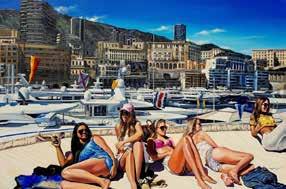COMMUNITY
The True Taste of the Algarve BY SOPHIE SADLER
My visit to the Saboreal factory in Parchal uncovered a story which started with a chance meeting on a beach and ended with a shared ambition to reinvent the Algarve’s extinct fish canning industry. I am there to meet one of the partners, Manuel Mendes, at the company’s spacious and immaculate warehouse. The smell of fish emanates from the interior, which is slightly incongruous with the industrial estate where it is located on the east side of the Arade river. We sat down outside the factory in an area which was once the hub of a thriving industry employing over 20,000 people. Tinned fish has been part of Portugal’s culinary heritage since 1853 when the canning industry was introduced. It became Portugal’s fast food, providing a cheap and convenient source of protein in times of economic instability and food shortages. Canned fish was a practical way to feed soldiers during military conflicts and was exported to the Portuguese colonies. In the 1940s, there were around 200 fish canning factories in the Algarve. By 1983, Portugal was one of the largest exporters of canned fish in the world: 34,000 tons a year were produced in 152 factories. In the late 1980s and throughout the 1990s, the canning industry suffered a terrible period of decline, in part because of the end of the colonial wars. The final blow was when Portugal joined the EU, which meant the country’s labour force came at a higher price. Many canneries were run by companies in Spain, France and Austria, who moved production to countries like Morocco where wages were low. When factories and producers closed their doors, canned fish slowly became a thing of the past.
8
Follow us on tomorrowalgarve
Jumping forward to 2014, Manuel, a pharmacist from Ferragudo, was looking for a change in direction, after nine years in business. It was during a year’s sabbatical to decide what he wanted to do that he saw a stranger on the beach and casually waved. That stranger was Vincent Jonckheere, a Belgian who had been working in the hotel industry and was also looking for a different career path. The two men got chatting. Vincent had learnt about the Algarve’s past industry at Portimão Museum, which is located on the Arade river. He left thinking: why is there no factory along the Arade River? Would it be possible for me to reignite the past? Vicente explained his idea of restarting the fish industry to Manuel. He mentioned it was hard for a foreigner to know how to start a business, so Manuel offered to help him with no idea of entering into the business himself. It was later that Manuel started to mull over the idea; the possibility of reclaiming some of Portugal’s proud heritage sparked a passion in him. “I have met many elderly people who worked in those factories and remember those days. And yet, the canning industry had been forgotten and replaced with tourism. Those former workers are delighted to see us trying to resurrect this industry. In the Algarve, our plentiful fish is a gift which we should be utilising. As we have seen with COVID-19, if we only focus on tourism we are setting ourselves up for a terrible fall.” Manuel and Vincent did not intend to repeat the mistakes of the past with low quality and low cost. In fact, the opposite is true: they send fish buyers to the docks as dawn is breaking, selecting the best of the night’s catch.















